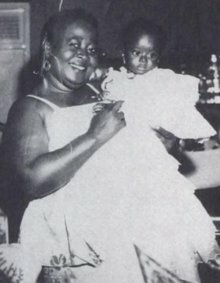Hannah Kudjoe, Ghana’s leading woman nationalist in the struggle for independence from British colonial rule in the 1940s and 1950s.

Life & Background
She was born in Busua, in the Western Region of the Gold Coast (now Ghana) in December 1918, Hannah Kudjoe was the youngest of 10 children. After finishing school, she became a popular dressmaker in Tarkwa, where she married J. C. Kudjoe.
He was a manager of a gold mine near Tarkwa. The marriage did not last, and she began living with her brother, E. K. Dadson, a prominent United Gold Coast Convention (UGCC) activist.
It was while living with her brother that she met Kwame Nkrumah, shortly after he returned in 1947 from a decade of studying abroad in the United States and Britain in order to take up the position of general secretary of the United Gold Coast Convention (UGCC).
Dadson was a strong UGCC activist and when Nkrumah came to Tarkwa, he lodged at the Dadson house.
She started supporting the United Gold Coast Convention (UGCC), a political party formed to fight against British colonialists and grant Ghana its independence.
When Ghana’s Big Six were arrested, Hannah Kudjoe raised money and campaigned for their release.
She was also an active participant of the Positive Action, a series of political protests that eventually led to Nkrumah’s election and the formation of an independent nation.
Hannah Kudjoe was very involved in the Committee on Youth Organization within the UGCC and followed them when they split from the UGCC to form the CPP, and was the only woman present when the decision to split was made.
Legacy
After Ghana gained independence, Hannah Kudjoe founded the All-African Women’s League in 1957, which later became the Ghana Women’s League.
She also worked to establish day nurseries and nursery schools throughout the country, and recruited workers and teachers and provided amenities for these establishments.
Hannah Kudjoe died on 9 March 1986.